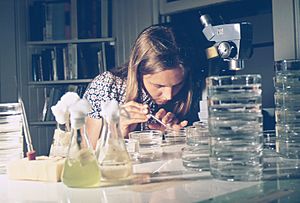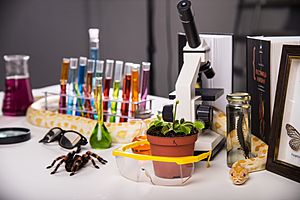Biologist facts for kids

Charles Darwin is a famous biologist.
A biologist is a scientist who studies biology. Biologists study living organisms. There are many different kinds of biologists. Some of these include:
- Those who study fish and ocean plants. They are called marine biologists.
- Those who study very small bacteria or Viruses.
- Other scientists study groups of animals.
- People who look at DNA in cells are called geneticists.
- Some biologists study using cells in factories and companies, and that is called biotechnology.
Specialists
Most biological scientists specialize in the study of a certain type of organism or in a specific activity, although recent advances have blurred some traditional classifications.
- Geneticists study genetics, the science of genes, heredity, and variation of organisms.
- Neuroscientists study the physiology of the nervous system.
- Developmental biologists study the process of development and growth of organisms
- Biochemists study the chemical composition of living things. They analyze the complex chemical combinations and reactions involved in metabolism, reproduction, and growth.
- Molecular biologists study the biological activity between biomolecules.
- Microbiologists investigate the growth and characteristics of microscopic organisms such as bacteria, algae, or fungi. Most microbiologists specialize in environmental, food, agricultural, or industrial microbiology; virology (the study of viruses); immunology (the study of mechanisms that fight infections); or bioinformatics (the use of computers to handle or characterize biological information, usually at the molecular level). Many microbiologists use biotechnology to advance knowledge of cell reproduction and human disease.
- Physiologists study life functions of plants and animals, in the whole organism and at the cellular or molecular level, under normal and abnormal conditions. Physiologists often specialize in functions such as growth, reproduction, photosynthesis, respiration, or movement, or in the physiology of a certain area or system of the organism.
- Biophysicists study how physics, such as electrical and mechanical energy and related phenomena, relates to living cells and organisms.
- Computational Biologists apply the techniques of computer science, applied mathematics and statistics to address biological problems. The main focus lies on developing mathematical modeling and computational simulation techniques. By these means it addresses scientific research topics with their theoretical and experimental questions without a laboratory.
- Zoologists and wildlife biologists study animals and wildlife—their origin, behavior, diseases, and life processes. Some experiment with live animals in controlled or natural surroundings, while others dissect dead animals to study their structure. Zoologists and wildlife biologists also may collect and analyze biological data to determine the environmental effects of current and potential uses of land and water areas. Zoologists usually are identified by the animal group they study. For example, ornithologists study birds, mammalogists study mammals, herpetologists study reptiles and amphibians, ichthyologists study fish, cnidariologists study jellyfishes and entomologists study insects.
- Botanists study plants and their environments. Some study all aspects of plant life, including algae, lichens, mosses, ferns, conifers, and flowering plants; others specialize in areas such as identification and classification of plants, the structure and function of plant parts, the biochemistry of plant processes, the causes and cures of plant diseases, the interaction of plants with other organisms and the environment, the geological record of plants and their evolution. Mycologists study fungi, such as yeasts, mold and mushrooms, which are a separate kingdom from plants.
- Aquatic biologists study micro-organisms, plants, and animals living in water. Marine biologists study salt water organisms, and limnologists study fresh water organisms. Much of the work of marine biology centers on molecular biology, the study of the biochemical processes that take place inside living cells. Marine biology is a branch of oceanography, which is the study of the biological, chemical, geological, and physical characteristics of oceans and the ocean floor. (See the Handbook statements on environmental scientists and hydrologists and on geoscientists.)
- Ecologists investigate the relationships among organisms and between organisms and their environments, examining the effects of population size, pollutants, rainfall, temperature, and altitude. Using knowledge of various scientific disciplines, ecologists may collect, study, and report data on the quality of air, food, soil, and water.
Images for kids
-
Nobel Prize-winning biologist Barbara McClintock.
-
Francesco Redi, founder of biology.
-
Martinus Willem Beijerinck, a botanist and microbiologist
See also
 In Spanish: Biólogo para niños
In Spanish: Biólogo para niños

All content from Kiddle encyclopedia articles (including the article images and facts) can be freely used under Attribution-ShareAlike license, unless stated otherwise. Cite this article:
Biologist Facts for Kids. Kiddle Encyclopedia.





